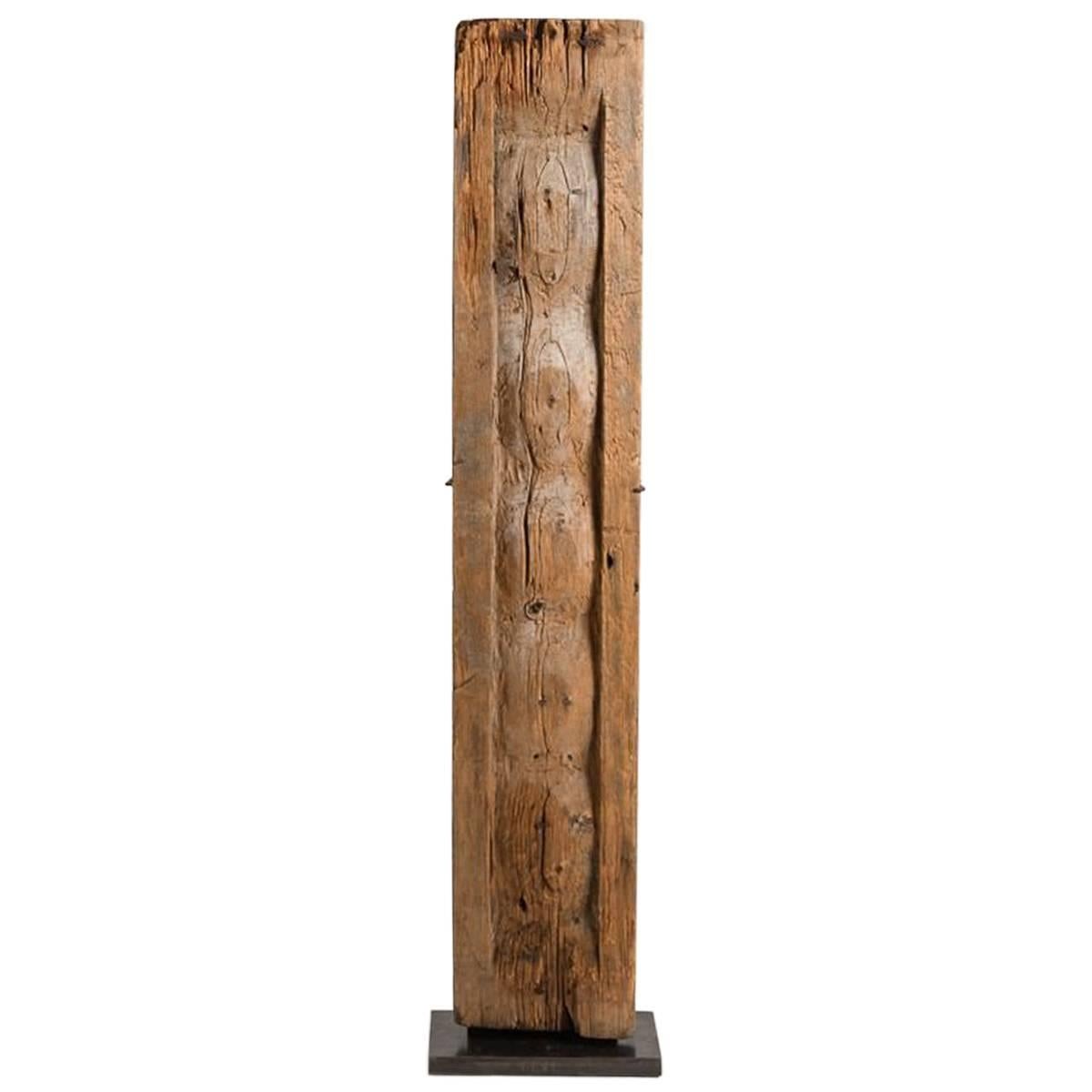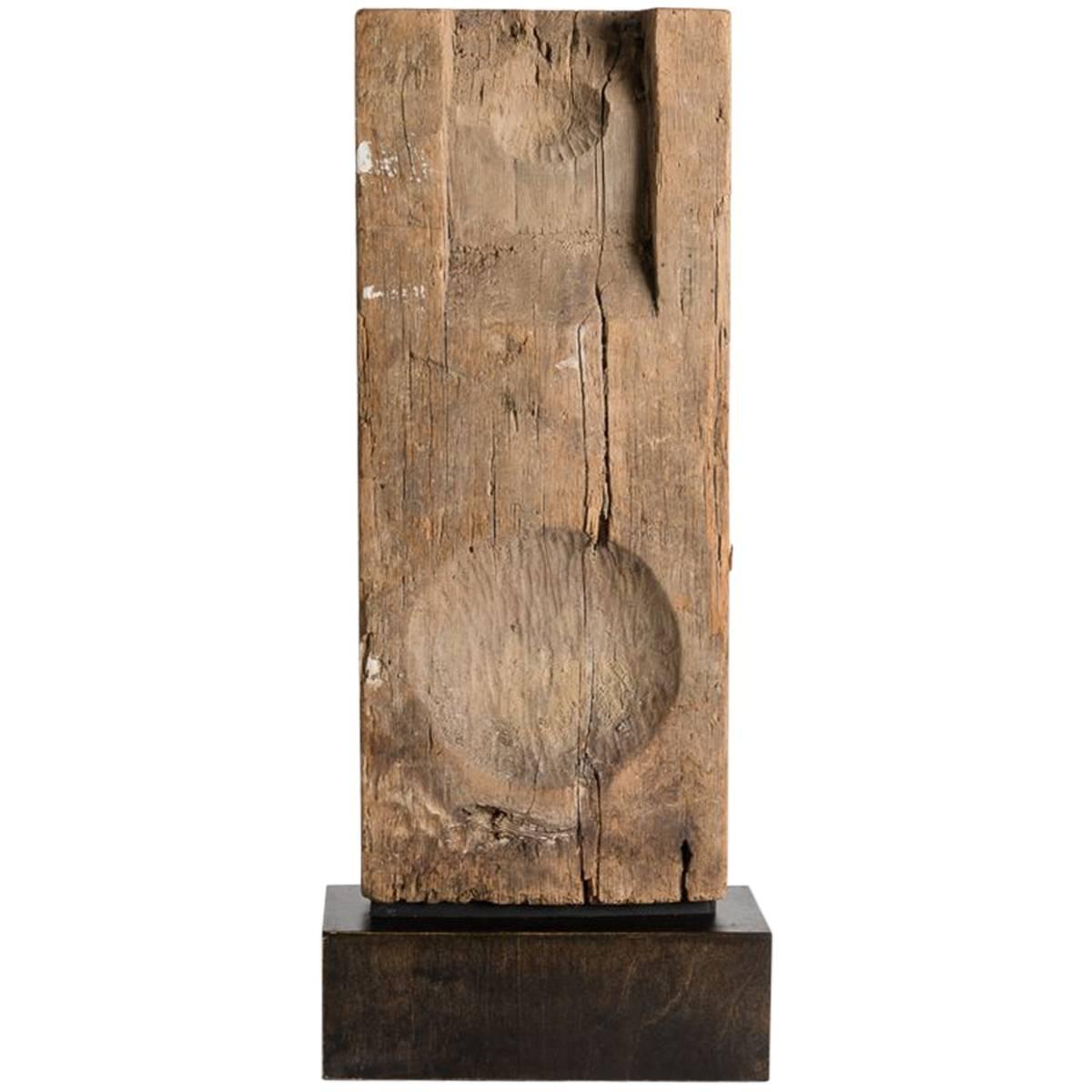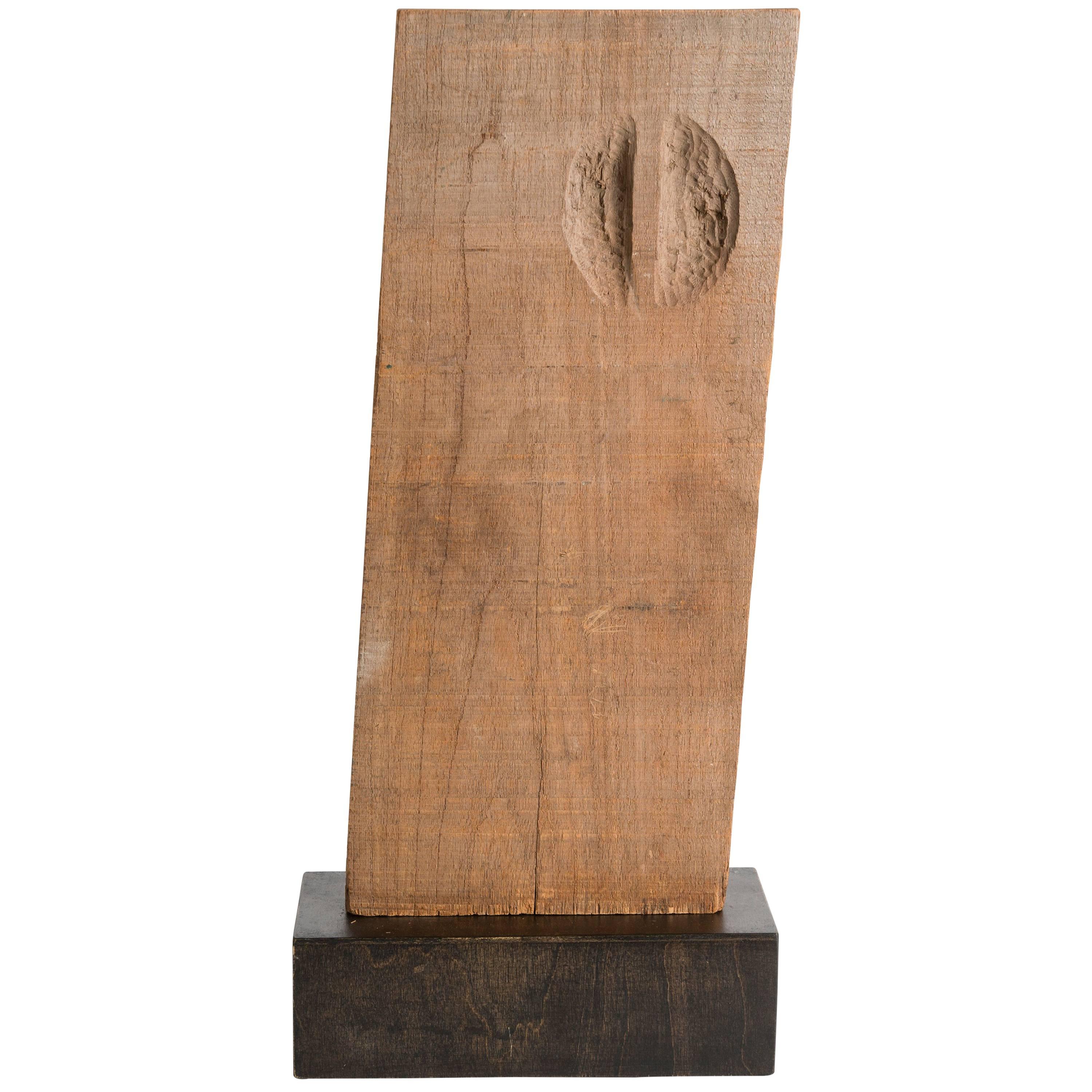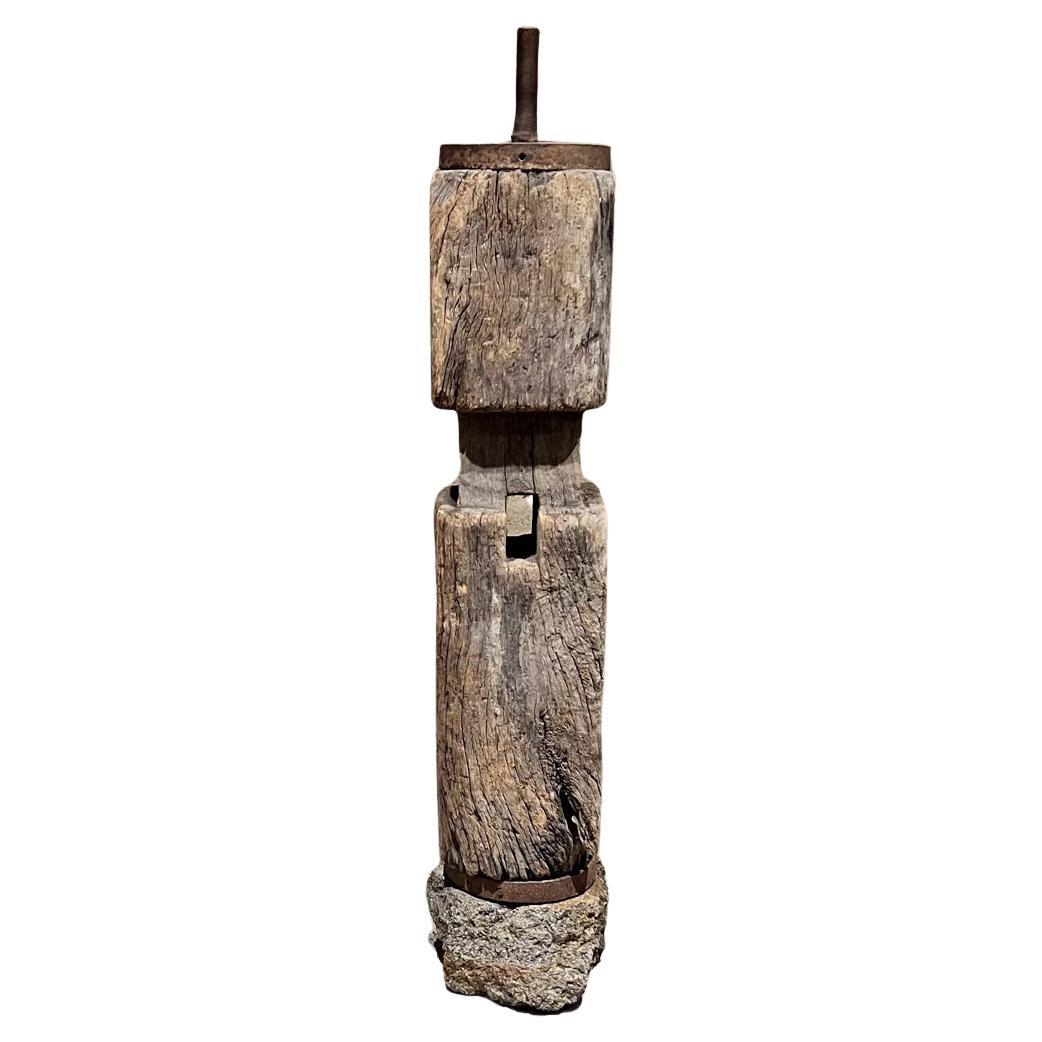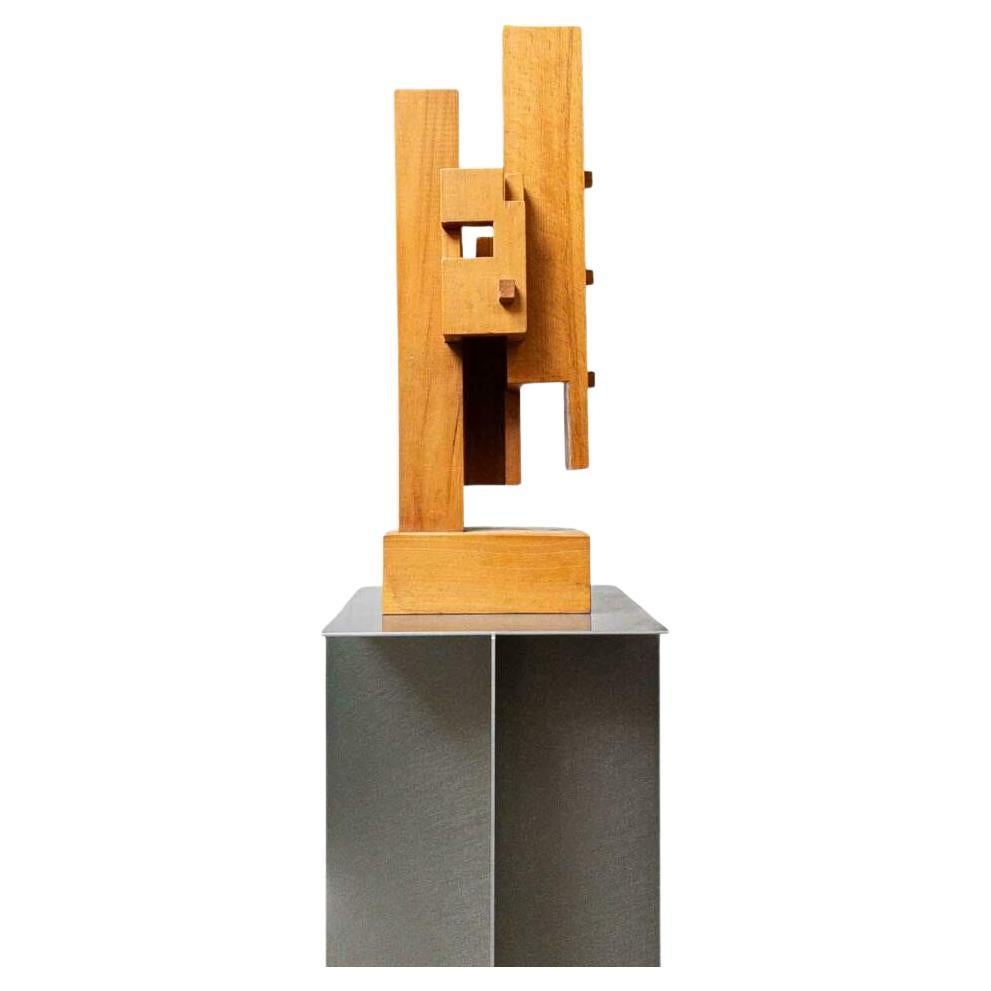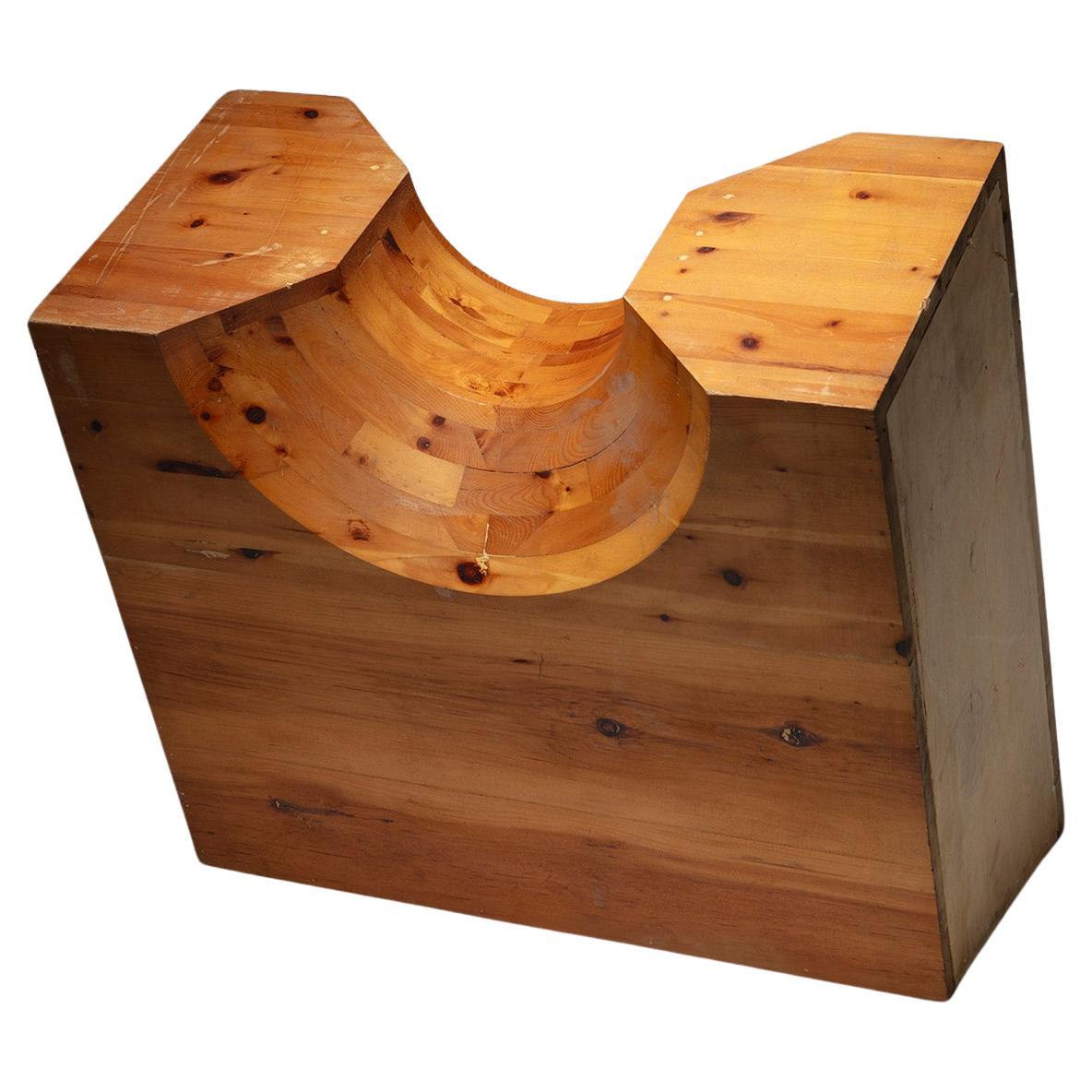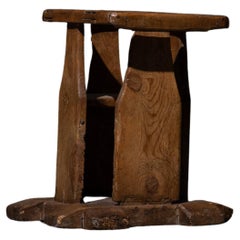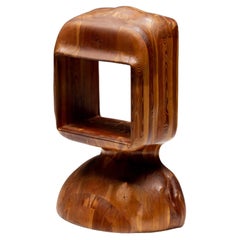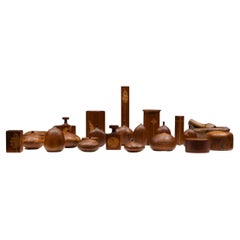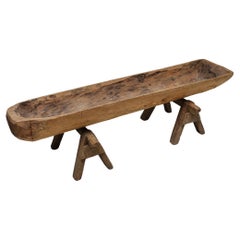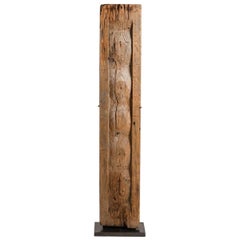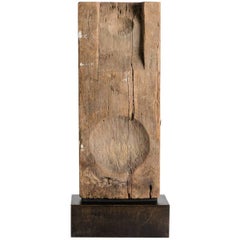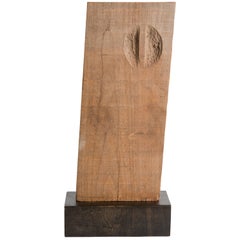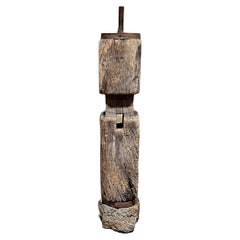Items Similar to Wooden Sculpture by Bernd Lohaus, Belgium, 1996
Want more images or videos?
Request additional images or videos from the seller
1 of 12
Wooden Sculpture by Bernd Lohaus, Belgium, 1996
$16,000
£12,094.02
€13,898.18
CA$22,279.90
A$24,785.48
CHF 12,992.86
MX$302,872.48
NOK 165,447.84
SEK 155,746.25
DKK 103,744.61
Shipping
Retrieving quote...The 1stDibs Promise:
Authenticity Guarantee,
Money-Back Guarantee,
24-Hour Cancellation
About the Item
Wooden sculpture by German artist Bernd Lohaus showcased in his solo exhibition at Galerie Micheline Szwajcer in 1996 Antwerp. Lohaus, a luminary figure in Antwerp's avant-garde art scene, more specifically in the formerly Wide White Space gallery, channels his profound exploration of materiality and language into a mesmerizing masterpiece. Crafted from Azobe wood, also known as red ironwood, sourced from wood dealers in Antwerp, this sculpture stands as a testament to the intersection of art and the urban landscape. Azobe wood, renowned for its resilience to seawater, was a staple in port and harbor constructions along the River Scheldt. Lohaus' meticulous yet minimalistic treatment of the wood allows its inherent characteristics to shine through, evoking a profound dialogue between material and meaning. Words delicately etched or ephemeral chalk inscriptions further elevate the sculpture, inviting viewers into a contemplative engagement with time, space, and human existence. With each stroke and inscription, Lohaus leaves an indelible mark on the viewer's psyche.
- Dimensions:Height: 22.84 in (58 cm)Width: 22.84 in (58 cm)Depth: 14.97 in (38 cm)
- Materials and Techniques:
- Place of Origin:
- Period:1990-1999
- Date of Manufacture:1996
- Condition:Wear consistent with age and use.
- Seller Location:Antwerp, BE
- Reference Number:Seller: GW38121stDibs: LU933439725232
About the Seller
4.8
Gold Seller
Premium sellers maintaining a 4.3+ rating and 24-hour response times
Established in 2008
1stDibs seller since 2012
1,100 sales on 1stDibs
Typical response time: 7 hours
- ShippingRetrieving quote...Shipping from: Antwerp, Belgium
- Return Policy
Authenticity Guarantee
In the unlikely event there’s an issue with an item’s authenticity, contact us within 1 year for a full refund. DetailsMoney-Back Guarantee
If your item is not as described, is damaged in transit, or does not arrive, contact us within 7 days for a full refund. Details24-Hour Cancellation
You have a 24-hour grace period in which to reconsider your purchase, with no questions asked.Vetted Professional Sellers
Our world-class sellers must adhere to strict standards for service and quality, maintaining the integrity of our listings.Price-Match Guarantee
If you find that a seller listed the same item for a lower price elsewhere, we’ll match it.Trusted Global Delivery
Our best-in-class carrier network provides specialized shipping options worldwide, including custom delivery.More From This Seller
View AllSculptural Functional Object, France, 19th Century
Located in Antwerp, BE
This unique wooden stool, originally used as a small child's seat, features a bold, sculptural base and hand-carved detailing that echo the spirit of late 19th to early 20th century ...
Category
Antique 19th Century French Rustic Children's Furniture
Materials
Wood
Studio Craft Sculptural Cabinet, United States, 1970s
By Wendell Castle
Located in Antwerp, BE
1970s Wendell Castle-inspired freeform organic console, crafted in the USA from rich, dark pine wood. A true protagonist piece of American Craft-based postwar art, its sculptural for...
Category
Vintage 1970s American Arts and Crafts Bookcases
Materials
Pine
$7,240 Sale Price
20% Off
Roger Sloan Wooden Sculpture, Mid-Century Modern, American Studio, 1970's
By Roger Sloan
Located in Antwerp, BE
Mid-Century Modern; Roger Sloan; American Woodworker; Craftsman; United States; Studio Crafts; American Studio; 1970's;
These unique wooden sculptures are designed by Michigan Wo...
Category
Vintage 1970s American Mid-Century Modern Abstract Sculptures
Materials
Wood
Rustic Wabi Sabi Console, France, 1940s
Located in Antwerp, BE
Console, planter, Sculpture, wabi-sabi, Decorative item, Rustic, Artwork, 1940's, France;
What was once a drinking trough for animals, is now a dec...
Category
Vintage 1940s French Rustic Sculptures and Carvings
Materials
Wood
Naive Folk Art Sculpture, France, 1950s
Located in Antwerp, BE
Naive sculpture from the 1950s, embodying the essence of Folk Art with its intricately carved vine. This anonymous masterpiece from Auvergne, France, s...
Category
Vintage 1950s French Folk Art Sculptures and Carvings
Materials
Wood
Vernacular Bonnetière, France, 19th Century
Located in Antwerp, BE
This 19th-century French "Berle" bonnetière is a rare example of Cévenol folk craftsmanship from the Ardèche region. Traditionally used for storing clothing or linens, the Berle is d...
Category
Antique 19th Century French Rustic Cupboards
Materials
Wood
You May Also Like
Yongjin Han, a Piece of Wood, Sculpture, United States, 1976
By Yongjin Han
Located in New York, NY
Unique piece.
Sculpted in 1976, this is a rare piece for the famed sculptor Yongjin Han, who usually worked in stone. Nonetheless, it is a quintessential example of his serene com...
Category
Late 20th Century American Abstract Sculptures
Materials
Wood
Yongjin Han, Piece of Wood, Sculpture, United States, 1976
By Yongjin Han
Located in New York, NY
Yongjin Han was born in Seoul, South Korea in 1934. After the Korean War—in which he fought, lying about his age in order to enlist—he was one of six students admitted to the sculpture program at the Seoul National University. At the time of his enrollment little of his native city remained intact; nonetheless, he had never felt more responsible to his work, firm in the conviction that artistic expression is every bit as essential to life and human nature as eating, drinking, or breathing.
One of Han’s teachers was Kim Chong Yung, a pioneer of Korean abstract sculpture, and by the time of his graduation he had adopted the abstraction that had seized both Europe and the United States several years before. . In 1967 he relocated to the USA, where he studied at Dartmouth and Columbia. Over the course of his long career the artist returned to Korea with frequency and made extended stays in Japan and Europe.
Trips to Korea signified something more than mere homesickness: Han’s work, though made largely in America, remained grounded in his rich cultural heritage. Korea rests on a bedrock of granite, and freestanding sculpture produced of the stone has for centuries demarcated sites of historical and religious significance. Han’s sculpture bridges this past with modernity. Richard A. Born, former Curator at the Smart Museum at the University of Chicago, has said that Han “brought Korea’s tradition of direct stone carving out of figuration into a refined, non-objective abstraction.”
For his part, Han put very little stock in designations; his focus, instead, was on the stone itself. His pieces explore a certain harmonization with nature. Han, when describing his work, said, "As stone has been around since the beginning of time, it has much to teach us if we care to slow down and listen." He believed that each stone has its own history, character, and energy and that his task was to draw out these inherently spiritual qualities. He described his process as a “dialogue” with his material: "The stone tells me it has an itch in a certain spot, so I scratch it—and we both feel better!"
Han worked alone and with manual tools, and the process is arduous. Carving stone this way takes time, and, what’s more, required great force—yet Han’s sculptures, even the monumental ones, are, as friend and fellow artist David Parker...
Category
Late 20th Century American Abstract Sculptures
Materials
Wood
Yongjin Han, a Piece of Wood, Sculpture, United States, 1976
By Yongjin Han
Located in New York, NY
Yongjin Han was born in Seoul, South Korea in 1934. After the Korean War—in which he fought, lying about his age in order to enlist—he was one of six students admitted to the sculpture program at the Seoul National University. At the time of his enrollment little of his native city remained intact; nonetheless, he had never felt more responsible to his work, firm in the conviction that artistic expression is every bit as essential to life and human nature as eating, drinking, or breathing.
One of Han’s teachers was Kim Chong Yung, a pioneer of Korean abstract sculpture, and by the time of his graduation he had adopted the abstraction that had seized both Europe and the United States several years before. . In 1967 he relocated to the USA, where he studied at Dartmouth and Columbia. Over the course of his long career the artist returned to Korea with frequency and made extended stays in Japan and Europe.
Trips to Korea signified something more than mere homesickness: Han’s work, though made largely in America, remained grounded in his rich cultural heritage. Korea rests on a bedrock of granite, and freestanding sculpture produced of the stone has for centuries demarcated sites of historical and religious significance. Han’s sculpture bridges this past with modernity. Richard A. Born, former Curator at the Smart Museum at the University of Chicago, has said that Han “brought Korea’s tradition of direct stone carving out of figuration into a refined, non-objective abstraction.”
For his part, Han put very little stock in designations; his focus, instead, was on the stone itself. His pieces explore a certain harmonization with nature. Han, when describing his work, said, "As stone has been around since the beginning of time, it has much to teach us if we care to slow down and listen." He believed that each stone has its own history, character, and energy and that his task was to draw out these inherently spiritual qualities. He described his process as a “dialogue” with his material: "The stone tells me it has an itch in a certain spot, so I scratch it—and we both feel better!"
Han worked alone and with manual tools, and the process is arduous. Carving stone this way takes time, and, what’s more, required great force—yet Han’s sculptures, even the monumental ones, are, as friend and fellow artist David Parker...
Category
Vintage 1970s American Abstract Sculptures
Materials
Wood
Primitive French Wood Form Abstract Sculpture
Located in Chula Vista, CA
For your consideration, a Primitive French Wood Form Sculpture
unmarked
Dimensions: 51 h x 9 x 9.5
Original form unrestored condition
Refer to images listed
Delivery within 200 mile...
Category
Early 20th Century Rustic Abstract Sculptures
Materials
Wood
Architectural 1980s Dutch Constructivist Solid Wood Sculpture, De Stijl
Located in AMSTERDAM, NL
This solid wood sculpture, commissioned by the city of The Hague, evokes architecture with its stacked geometric blocks reminiscent of a model for an apartment building. Created in t...
Category
20th Century Abstract Sculptures
Materials
Wood
$5,222 Sale Price
20% Off
Large Solid Wood abstract Sculpture, Italy, 1970s
Located in Milan, IT
Large solid wood abstract geometric sculpture.
Category
Vintage 1970s Italian Abstract Sculptures
Materials
Wood
